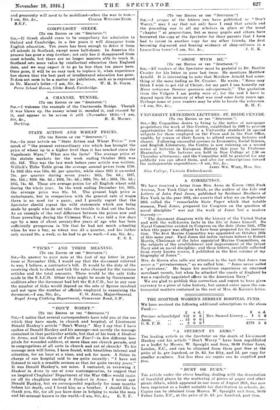A CHANNEL TUNNEL
(To THE EDITOR Or THE "SPECTATOR.")
SIR,-1 welcome the example of the Czernavoda Bridge. Though it was blown up, the enemy seized it, mended it, and crossed by it, and appear to be across it still (November 11th).-! am, Sir, &c., H. E. MALDEN. Dorking.
STATE ACTION AND WHEAT PRICES. (To THS Faeroe OF THE "SPECTATOR:1
Sia,-In your article on "State Action and Wheat Prices" you speak of "the present extraordinary rise which has brought the price of wheat up to a higher level than it has touched since the Napoleonic Wars." What are the facts? The average price at the statute markets for the week ending October 28th was 112s. 10d. This was the last week before your article was written. Willich's Tithe Table gives the average annual prices from 1790. In 1812 this was 126s. Gd. per quarter, while since 1815 it exceeded 70e. per quarter during seven years : 1815, 78s. Gd.; 1817, 96s. 11d.; 1818, 86s. 3d.; 1819, 74s. Gd.; 1839, 70s. 8d.; 1854, 725. 5d.; 1855, 74s. 3d. These are average prices for all English wheat sold during the whole year. In the week ending December 1st, 1855, the average price was 83s. Id. The present high price is unfortunate, but in comparison with the general rate of wages there is no need for a panic, and I greatly regret that the Spectator should repeat the wild statements which are being made by people who do not take the trouble to find out the facts. As an example of the real difference between the prices now and those prevailing during the Crimean War, I was told a few days ago by a man of about seventy-five years of age who has been sufficiently prosperous in life that he had not much schooling when he was a boy, as wheat was .25 a quarter, and his father only earned 10s. a week, so he had to go to work.-! am. Sir, &c., F. S. I.












































 Previous page
Previous page